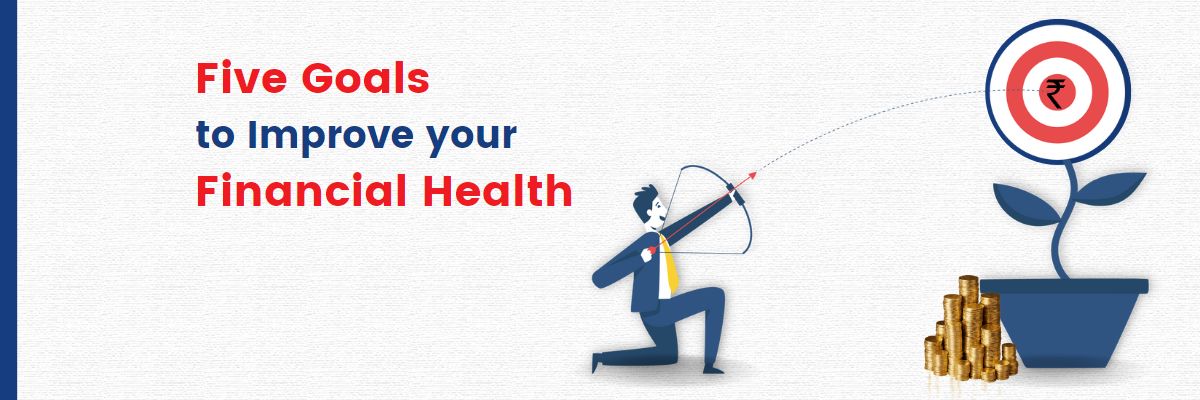With the new financial year coming up, many people are gearing up to make resolutions and commitments to improve their financial health by adopting healthy financial habits. Just like maintaining a healthy diet and exercise regimen is crucial for physical health, having sound financial health and managing money effectively is vital for achieving financial stability and security. The new financial year presents an ideal opportunity to reflect on past financial plannings, identify areas that need improvement, and take proactive steps to establish healthy financial habits that will lead to a brighter financial future.
What Is Financial Health?
The Financial Health Institute defines financial health as “The dynamic relationship of one’s financial and economic resources as they are applied to or impact the state of physical, mental, and social well-being”.
While this isn’t a strict definition by any means, in today’s world, where the economy fluctuates on a daily basis, and inflation can be severely detrimental to personal well-being and health, it is safe to say that one’s personal monetary affairs can be directly described as an extension of a person.
And just like with physical or mental health, a state of financial security is necessary for personal well-being. Personal wealth, in his case, not only includes your earnings and your savings, but also your retirement plans, and how much you can positively spend. Being financially healthy can, hence, be defined as a state of having financial security and peace of mind associated with economic wealth.
How To Analyse Your Financial Health?
There are no strict guidelines as to how financial health can be measured. It is a layered concept and isn’t tied to a single economic entity. Experts have, over the years, laid out rough guidelines that could potentially help you gauge your financial health. You require a perfect financial health assessment tool or criteria that you could use to analyze your situation. Here are some of them for your ready reference.
→ Net Worth
The simplest one on this list, net worth, although a considerably basic thing, can give you a decent idea of how you’ve grown over the years. It’s easy to calculate and can be kept track of by using something as basic as pen and paper or spreadsheet software. To calculate your net worth, all you need to do is note down all your assets, including cash, investments, and even property value, and subtract everything that you can consider debt, such as loan repayment, credit card debt, and mortgage. While this isn’t a direct indicator of financial health, comparing your periodic net worth is a good indicator of your own personal growth.
→ Emergency fund ratio
This is a ratio that essentially gives you an idea of your financial condition in case of emergencies, assuming you can meet your monthly expenses. The ratio is calculated by summing up your total cash at hand and your bank balance and then dividing that total by your monthly expenditure. Ideally, you’d want this ratio to be above two or three, which would indicate sufficient emergency funding.
→ Savings ratio
The ratio of your total investments per month and your total monthly income indicates savings made in a particular month. The ideal point for this ratio would be anywhere above 0.2, although a minimum of 0.1 is recommended.
→ Liquidity ratio
Similar to the emergency fund ratio, the liquidity ratio is a good indicator of how many liquid assets you have in case of unforeseen financial situation. While investing in various different kinds of assets is good, people often get side-tracked and invest without thinking about keeping any liquid assets. The sum of all your liquid assets (cash and assets that can be easily cashed) divided by your net worth will give you your liquidity ratio. Typically, it is recommended to have a ratio of at least 0.1, although anything between 0.2-0.3 is ideal.
How To Manage Your Financial Health?
Once you’ve assessed your financial condition, it might be time to start thinking of ways to manage your financial health to have positive net growth across the years, while maintaining the various ratios we discussed. Here are five goals that you should have to improve your financial health:
• Review your financial goals
If you’ve ever read a guide to investing money or saving money, then this point is something you’ve come across already. It is always a good idea to keep your financial goals in mind. Whether you’re saving up money to buy a new TV, or saving up for your retirement, why you save and invest should be something that you’re clear about. This can make assessing your personal financial health much easier.
• Re-evaluate your expenses and debts
While some debts are hard to avoid, such as home or vehicle loans, things like credit card debts and micro-loans can be detrimental to your financial health. Having a good credit score can be helpful for certain things, but it can also be something that can go off the rails quickly if you’re not paying attention. Keep a tab on your expenses and consider avoiding credit card debts over long periods as it can lead to unnecessary financial penalties.
• Re-evaluate your investments
The new year is already rolling out in full steam with major financial events rocking the nation. Global or national economic turmoil can happen at any time, and given the market volatility, a smart thing to do would be to review your existing investments and see how they are holding up. If you’re not already doing it, then diversifying your portfolio can help you manage losses should they occur.
• Try to increase your savings
This kind of goes hand-in-hand with something that was mentioned previously. Considering how you spend your money and what debts you have can give you a proper understanding of how to increase your savings. For example, if you spend your money regularly on a particular pantry staple, you might want to check if there are better and cheaper brands available. Sometimes, shopping locally can also help save money, while still procuring quality ingredients. Similarly, investing in a quality home improvement or luxury product, such as a good television, can help you save money in the long run. Keep an eye out for unnecessary expenses that could be avoided or can be replaced with something cheaper.
• Increase your financial knowledge
Understanding how the stock market works can help you make better investment decisions. Likewise, knowing what kind of long-term or fixed-income investment options you have available to you can help you save money over time, while also allowing you to save on taxes. Being aware of financial security issues can also help protect you from fraud and scams. In short, being literate about the financial world is an asset in itself and even the most basic of knowledge can help protect your money and keep your finances safe.
In Conclusion
With the new financial year rolling on, it is an opportune time to assess your financial health and determine if you are financially stable and secure. The tools and measures discussed in this blog can be used to evaluate the financial health of a company or to assess employee financial health. By examining key financial indicators such as revenue, expenses, cash flow, and debt levels, businesses and employees can gain insights into their financial health and take necessary steps to improve it. With a focus on financial health, companies can make informed decisions, manage risks, and plan for the future, while employees can improve their financial well-being and achieve greater financial stability.
Partner with us to achieve financial health! Open a Trading & Demat Account today and begin building a solid financial future with our expert guidance.








